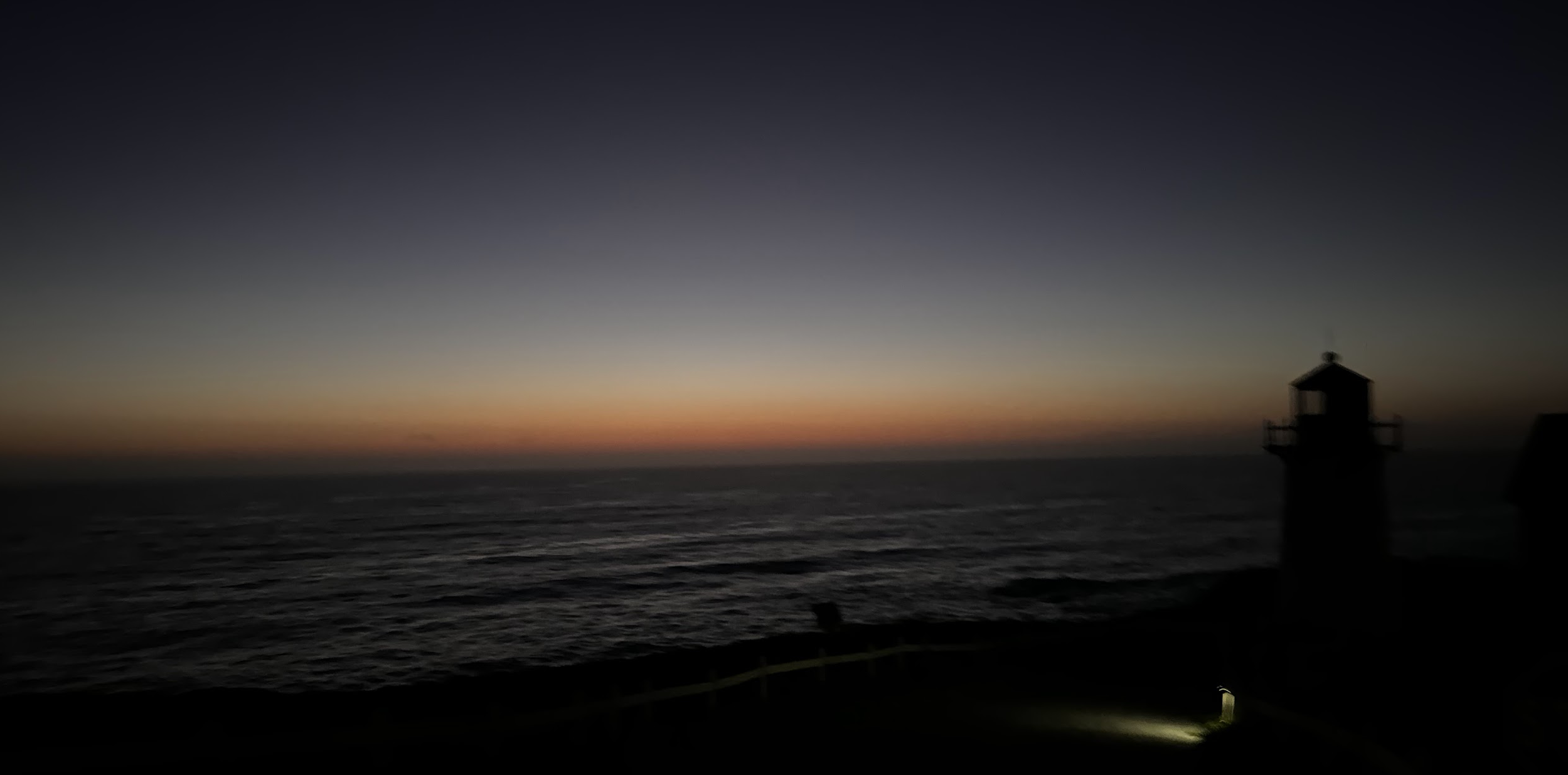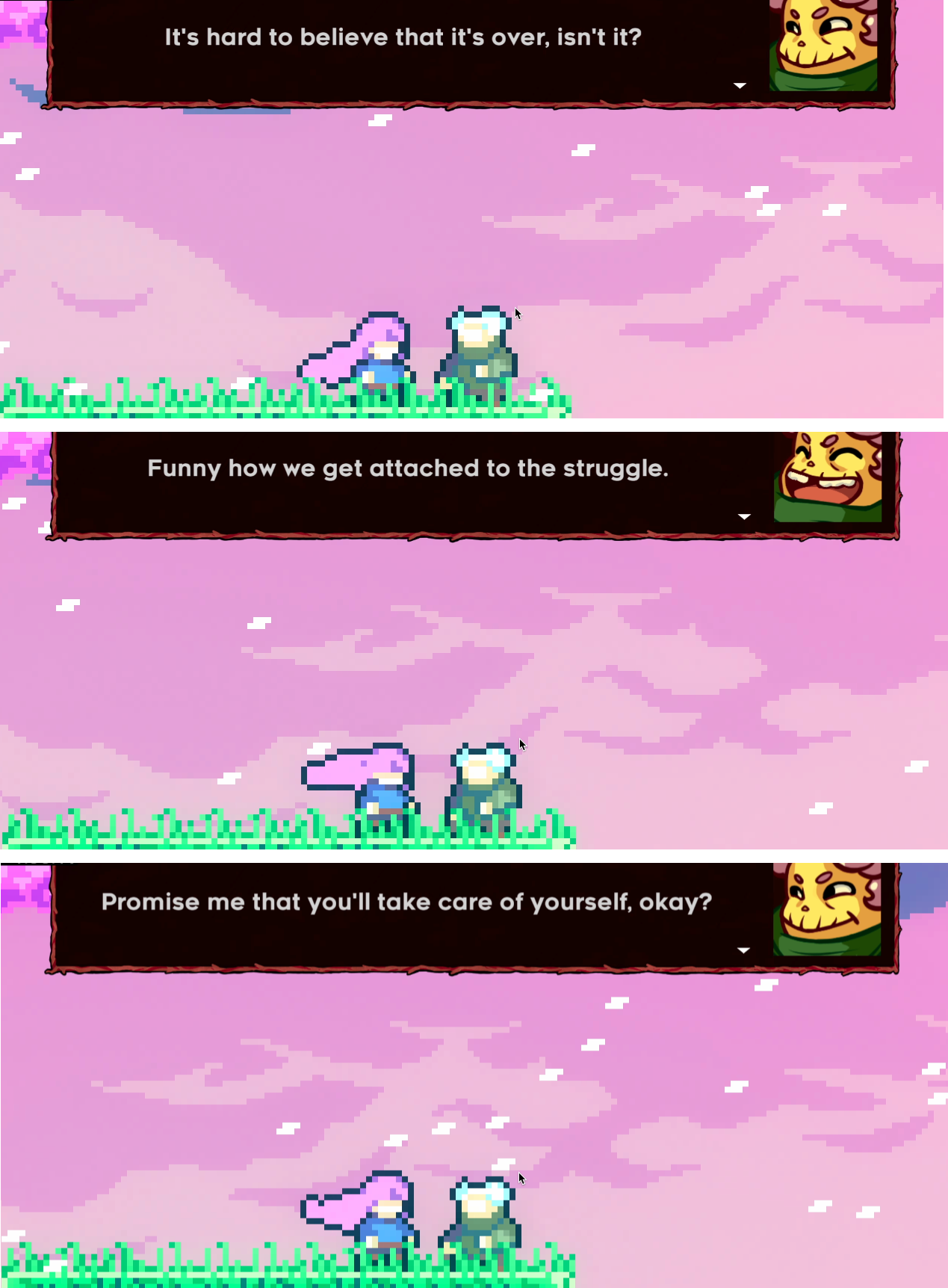On love, understanding, and leaving a good thing behind. Alternatively titled: afterglow.

How are you feeling?
I’m not sure. I can’t really put into words quite yet but I definitely feel it as an emotion in my body. I think just acknowledging I walked through a one-way door that I can’t undo is scary.
Yeah. I know that can’t have been an easy decision to make.
[The glow of the sunset slowly fades]
Part of me feels scared of over-intellectualizing these feelings. I know exactly how I should rationally think about things or whatever the ‘correct’ feelings to have are but it sometimes feels frustrating that they don’t always match up with what I’m actually feeling.
I think it’s okay to just feel the emotions for what they are. A calculus of the heart will miss things and maybe even impede the recognition for what is truly being felt. It almost feels like a false sense of comforting yourself by pretending the real loss can be made with enough of something else (logic, reason, distraction)1. What do you think you’re actually feeling right now?
I don’t think I know the right words for that either, yet.
That’s okay.
… Well, I do know that I feel a profound sense of loss. It feels quite sad to have come to the realization and finally to make the decision that the person I thought I wanted to spend my life with grew into a different person. … I think I realized that, at some point, we had grown apart into people that wanted different things from life. There’s this one Annie Dillard quote I come back to often: “How we spend our days is, of course, how we spend our lives.” The days we lived no longer seemed indicative of how we wanted to spend our lives.
Do you think you used to feel like that was more aligned for both of you?
Yeah. Though I think we were both much younger then. Malleable even.
[A strong gust of wind blows their hair back. Both start chuckling a little.]
I think we didn’t know who we wanted to be when we both made a commitment to each other that we’d be partners for life. We were young and impressionable and wanted to do right by each other. I thought, and honestly still think it very much is, beautiful to love the loves of your love. At some point though, I think we each found better articulations of the questions we wanted to spend our lives figuring out and they weren’t exactly the same things. It became really hard to have the same appreciation and excitement as we used to when those things overlapped much more. I guess to put it simply, it moved from an unconscious effort to an effortful and conscious one. For a while, we justified that drift and space as necessary to growing up together; giving us each the space to become our own people.
It does seem like you both lost a point of joint rapture though. Even in being different people, it almost feels critical to have some third thing that you both care about immensely, coming together in double attention. Without it, you just become two separate people without anything that brings you together. The Little Prince author Antoine de Saint-Exupéry beautifully insisted that “love does not consist of gazing at each other, but in looking outward together in the same direction.”
But what about witnessing the other? Is that not enough? After all, it still feels very important to feel seen in your relationships — regardless of whether they are romantic or platonic. Tom Stoppard painted the grand achievement of our emotional lives as “knowledge of each other, not of the flesh but through the flesh, knowledge of self, the real him, the real her, in extremis, the mask slipped from the face.” It seems weird that some third thing that is outside the relationship be central to it?
Maybe this is silly, but I think that it is almost a pre-requisite to have things you both care about outside of the relationship before you are even interested in each other. So much of what we are is what we care about in the world. It seems really implausible (unhealthy even!) to have your whole entire world be only about the other person.
[One of them got up to look at a seashell on the beach.]
So you’re saying that your shared history together is relative irrelevant compared to your current interests?
No, I don’t think I’m saying that exactly either. I think having a lived life together is very important to add richness and depth to the relationship, but I don’t think you can live fully off of what has existed in the past. You both have full lives ahead of you! Relative to the many years left ahead, I think it makes sense to have these third things you both care about to make the life you will live in the future full and meaningful.
Hm. I still feel quite guilty about not being able to grow to see the world the same way. There’s an ideal world in which it was easy to understand and love the same things. I remember we made a commitment to each other and it feels terribly selfish to go back on that. I want to be someone who is reliable — someone whose word people can depend on to plan their lives around.
I don’t think it’s selfish to have strong conviction in what you find worthwhile and beautiful in the world. The beauty of the world is different to everyone that perceives it and I think that’s part of the lived human experience. I think it’s quite silly to change that for someone else.
Doesn’t any union of two things involve some form of compromise? How do you think about what you can compromise and what you can’t? How incompatible is too incompatible?
Well that’s a good question. It almost feels like there’s this weird catch 22 around commitment and people. On one hand you don’t really know how compatible you are with someone until you spend a lot of time with them. On the other hand, it’s hard to know if you want to commit to someone until you know how compatible you are with them. There’s a whole realm of theory around optimal stopping that tries to solve this in a rigorous and mathematical way (reject the first people you date, etc.) but I still feel a calculus of the heart will always end up missing things.
I’m curious why you don’t find optimal stopping theory convincing here?
Well I think optimal stopping makes the assumption that one can always have enough information sufficient to rank the person amongst all the people they’ve met so far. I don’t think this is actually true in real life, you will always have future experiences that recolour and recontextualize your past. A decision you may have thought to have been optimal at some point may change when you learn something else in the future; either about yourself or the other person.
Yeah. It also seems like optimal stopping theory makes an assumption that both stay stagnant throughout the relationship which doesn’t seem true. In a relationship, you both are shaping how you each grow.
It seems like there are at least two ways you can think about this act of growing together. The optimist will believe that there will always be a way to fix and repair things if they try.
Ah I’m reminded of a Thich Nhat Hanh quote, “If you pour a handful of salt into a cup of water, the water becomes undrinkable. But if you pour the salt into a river, people can continue to draw the water to cook, wash, and drink. The river is immense, and it has the capacity to receive, embrace, and transform.” I think there are always ways to repair things and make it work if both people try.
But don’t you think there’s a point where things become too different? I’m more of the camp that unconditional love does not necessarily imply unconditional tolerance. Just because a jigsaw puzzle piece will not fit naturally does not mean that you jam it in with force because you think the end picture might be beautiful.
Well I think that’s fair, there’s no point in making something obviously wrong work. But I think it unfair to classify a serious relationship under obviously wrong. Isn’t it enough for it to have been right at some point?
[The waves wash away any footsteps left on the beach as the tide rises slowly.]
I don’t think it’s a clear black and white either. I do think that there is some point where being in a relationship requires enough extra energy that it becomes unsustainable to keep existing in it. A dear friend recently wrote about the energy it takes to interpret ourselves for others around us. In the piece, they talk about how we all act with an “implicit theory of mind for each person we are around.” The more different our models of the world, the more cognitive work we need to interpret and rationalize the actions of one in terms of the other. If you grow apart, the amount of cognitive work you must do to translate between your two worlds quickly becomes a lot. I think it makes the act of witnessing — the act of having the other feel seen — much harder.
What do you think that looks like concretely?
A lot of it is subtle but compounds. It might look like different ways that you process loss, the different ways you might want to be comforted or celebrated, and how you spend your idle hours. The more different they are, the more it feels either person needs to be more like the other to be appreciated or seen.
Yeah, I think I felt this in the tail end of the relationship. There was a flipping point where the extra interpretation was draining enough that it became hard to do the interpreting in the first place. It becomes a vicious cycle where it took energy to interpret, which made it less likely that we put in the effort to do it, which made it harder to have those shared third things, which caused even more of a drift.
It’s funny that we get attached to the struggle isn’t it? At some point, the fight to make things work itself became a part of the defining aspects of the relationship.
I think I’m really glad that things ended where they did. We let it go before too much hurt was caused in either direction.
Are you glad it happened? The relationship as a whole?
Of course. I appreciate the part of our life we spent together and I don’t regret every decision we made to try. I think we lived it very fully throughout, even in the last moments. We are both people who don’t half-ass things and I know that as soon as we felt like we couldn’t put our full selves in it, it was better to leave it in a good place than to drag a slow and resentful end out of it.
Mm.
On this hike through life, we had the courage to split ways when we knew the destination was in different places and still had the grace to acknowledge that the path we’ve already travelled together was beautiful.
I’m really glad.
Me too. I think this trail that we walked together helped me grow into the person I am today. Even as we split, it helped me to find articulations for what I wanted out of the rest of my life.
[The two sat in silence, their silhouettes melding as the sunlight fades.]
I think we’ll be okay.
 Celeste (2018)
Celeste (2018)
Footnotes
-
Nussbaum, Against ‘assessing’ love ↩